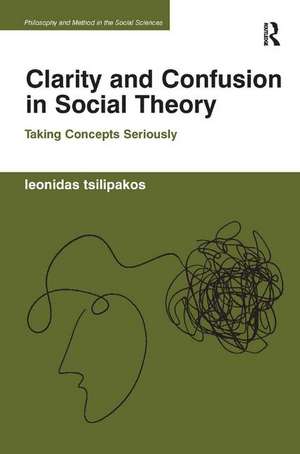Clarity and Confusion in Social Theory: Taking Concepts Seriously: Philosophy and Method in the Social Sciences
Autor Leonidas Tsilipakosen Limba Engleză Hardback – 28 ian 2015
| Toate formatele și edițiile | Preț | Express |
|---|---|---|
| Paperback (1) | 382.16 lei 6-8 săpt. | |
| Taylor & Francis – 30 iun 2021 | 382.16 lei 6-8 săpt. | |
| Hardback (1) | 762.16 lei 6-8 săpt. | |
| Taylor & Francis – 28 ian 2015 | 762.16 lei 6-8 săpt. |
Preț: 762.16 lei
Preț vechi: 1101.58 lei
-31% Nou
Puncte Express: 1143
Preț estimativ în valută:
145.84€ • 152.27$ • 120.70£
145.84€ • 152.27$ • 120.70£
Carte tipărită la comandă
Livrare economică 04-18 aprilie
Preluare comenzi: 021 569.72.76
Specificații
ISBN-13: 9781472432407
ISBN-10: 1472432401
Pagini: 186
Dimensiuni: 156 x 234 x 18 mm
Greutate: 0.34 kg
Ediția:1
Editura: Taylor & Francis
Colecția Routledge
Seria Philosophy and Method in the Social Sciences
Locul publicării:Oxford, United Kingdom
ISBN-10: 1472432401
Pagini: 186
Dimensiuni: 156 x 234 x 18 mm
Greutate: 0.34 kg
Ediția:1
Editura: Taylor & Francis
Colecția Routledge
Seria Philosophy and Method in the Social Sciences
Locul publicării:Oxford, United Kingdom
Cuprins
Clarity and Confusion in Social Theory
Notă biografică
Leonidas Tsilipakos is Chrystal Macmillan Research Fellow in the Department of Sociology at the University of Edinburgh, UK.
Recenzii
’Drawing on the philosophical insights of Ludwig Wittgenstein, J.L. Austin, Gilbert Ryle, Peter Winch, and related arguments, Leonidas Tsilipakos presents a lucid, incisive, and powerful critique of the manner in which, what he characterizes as, the theoretical attitude and attending conceptual confusions have become endemic in much of contemporary social theory. Building on his critical analysis, he offers a vision of a different path forward in social inquiry.’ John Gunnell, SUNY, Albany, USA ’This book is a lucid application of the methods and techniques of ordinary language philosophy to contemporary social theory. Dr Tsilipakos argues convincingly that much of the confusion in current social theory is rooted in adherence to an inappropriately narrow range of conceptual resources and in dogmatic preoccupation with misconceived ontological questions. Clarity and Confusion in Social Theory provides a salutary corrective to social theories that succumb to the allure of scientism.’ P.M.S. Hacker, University of Oxford, UK
Descriere
Making use of the insights and practice of Ordinary Language Philosophy, understood as encompassing the work of Wittgenstein, Ryle, Austin and their followers, Clarity and Confusion in Social Theory reveals the profound logical flaws in some of the central methodological procedures often employed in social theory for dealing with concepts, offering alternative approaches to social scientists and philosophers for tackling the conceptual issues that have so bedevilled social science from its inception.








